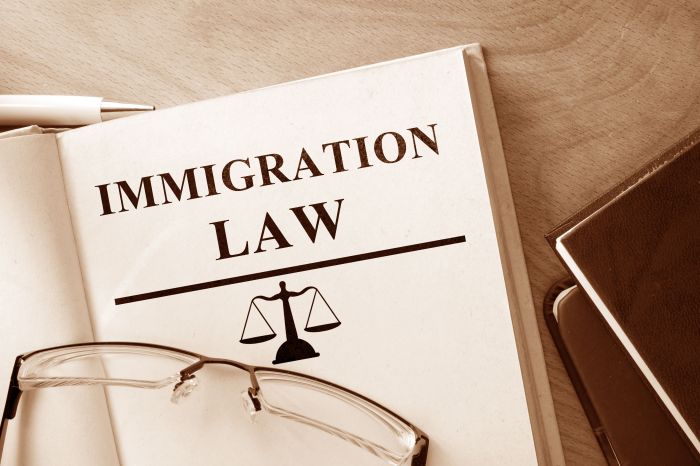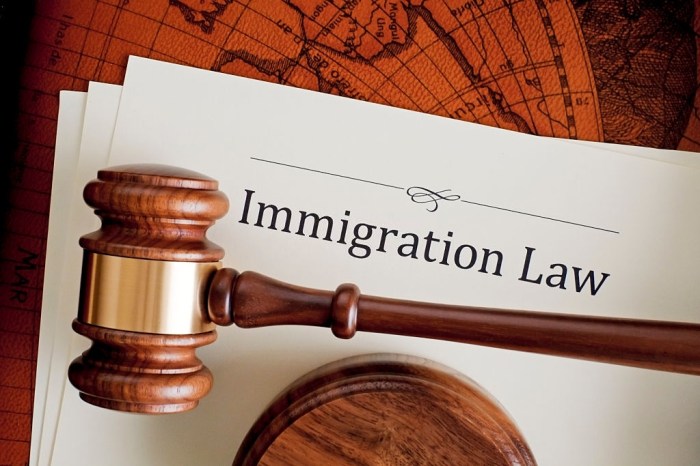Navigating the complexities of immigration law can be a daunting task. That’s where immigration lawyers step in, offering expert guidance and support throughout the process. They possess a deep understanding of the legal landscape and can help you navigate the often-complex immigration system.
Working with an immigration lawyer can provide invaluable benefits. They can assess your eligibility for various visas and green cards, prepare and file necessary paperwork, represent you in court or before immigration officials, and keep you informed of your case status.
Their expertise can significantly increase your chances of a successful outcome.
The Role of an Immigration Lawyer

Navigating the complex world of immigration law can be daunting. This is where immigration lawyers step in, providing invaluable guidance and representation to individuals and families seeking to enter, remain, or navigate the U.S. immigration system.
Immigration lawyers possess a deep understanding of the ever-evolving immigration laws and regulations. They are equipped to handle a wide range of immigration matters, including:
Types of Immigration Cases
- Family-based immigration, such as green cards for spouses, children, and parents.
- Employment-based immigration, including visas for skilled workers, investors, and entrepreneurs.
- Asylum and refugee status for individuals fleeing persecution or violence.
- Deportation defense and removal proceedings.
- Citizenship applications and naturalization.
Specific Legal Services Offered
The legal services provided by immigration lawyers extend beyond case representation. They also offer:
- Legal advice and consultations on immigration matters.
- Preparation and filing of immigration applications and petitions.
- Representation at immigration interviews and hearings.
- Assistance with obtaining work permits, travel documents, and other immigration benefits.
- Legal research and analysis on immigration laws and policies.
Choosing the Right Lawyer
Finding the right immigration lawyer can significantly impact your case’s outcome. Here are some tips to guide your search:
Consider the lawyer’s specialization. Immigration law is a complex field with various subcategories, such as family-based immigration, employment-based immigration, and asylum law. Choose a lawyer who specializes in the specific area of law that applies to your case.
Check their experience and track record. Look for lawyers who have a proven history of success in handling cases similar to yours. Read online reviews and ask for references to assess their credibility.
Fees and Communication
Inquire about the lawyer’s fees and payment structure. Be clear about the costs involved and any additional expenses you may incur.
Establish clear communication expectations. Determine how often you can expect updates, the lawyer’s preferred communication methods, and their availability for consultations.
Establishing Expectations
It’s crucial to set clear expectations with your lawyer. Discuss your goals, timelines, and any concerns you have. This will ensure that both parties are on the same page throughout the process.
Communication and Documentation

Open and effective communication is crucial when working with an immigration lawyer. Clear communication ensures both parties are on the same page, reducing the risk of misunderstandings and ensuring a successful outcome.
Immigration cases often require extensive documentation. This includes personal documents such as passports, birth certificates, and marriage certificates, as well as financial records and employment history. The lawyer will guide you on the specific documents required for your case.
The Role of Technology
Technology has revolutionized communication and document sharing in immigration cases. Secure online platforms allow clients to share sensitive documents and communicate with their lawyers conveniently and securely.
Fees and Payment Structures

The cost of hiring an immigration lawyer varies depending on the complexity of the case, the lawyer’s experience, and the fee structure used.
Lawyers typically use one of three fee structures: hourly rates, flat fees, or contingency fees. Hourly rates are the most common, with lawyers charging by the hour for their time spent on the case. Flat fees are a fixed amount that covers all the legal services required for a particular case.
Contingency fees are only paid if the lawyer is successful in winning the case, and the fee is typically a percentage of the amount recovered.
Payment Options
Lawyers typically require a retainer fee before starting work on a case. A retainer fee is a deposit that is held in trust by the lawyer to cover the cost of legal services. Lawyers may also offer payment plans that allow clients to spread out the cost of legal fees over time.
The Immigration Process

The immigration process can be complex and time-consuming, but it is essential to understand the steps involved to ensure a successful outcome. Here is a timeline outlining the key stages of the immigration process:
- Pre-filing: This stage involves gathering necessary documents, determining eligibility, and preparing the application.
- Filing: The application is submitted to the appropriate government agency, along with supporting documentation.
- Processing: The government agency reviews the application and conducts background checks and interviews as needed.
- Decision: The government agency makes a decision on the application, either approving or denying it.
- Post-approval: If the application is approved, the applicant may need to complete additional steps, such as obtaining a visa or green card.
Throughout the process, an immigration lawyer can provide valuable guidance and support. They can help prepare the application, represent the applicant in interviews, and advocate for their rights if any issues arise.
Common Challenges and Delays
The immigration process can be subject to delays and challenges. Some common issues include:
- Missing or incomplete documentation: Failing to provide all necessary documents can delay the processing of the application.
- Background checks: Criminal history or other issues uncovered during background checks can lead to delays or even denial of the application.
- Changes in immigration laws: Changes in immigration policies or regulations can impact the processing time and requirements for applications.
It is important to work with an experienced immigration lawyer who can anticipate potential challenges and develop strategies to mitigate delays.
Legal Representation and Advocacy

Immigration lawyers play a crucial role in representing their clients before immigration authorities, safeguarding their rights and interests throughout the immigration process.
Immigration cases often involve various types of hearings and interviews, such as asylum hearings, deportation proceedings, and naturalization interviews. During these proceedings, the lawyer acts as the client’s advocate, presenting evidence, examining witnesses, and arguing on their behalf.
Advocacy in Immigration Cases
- Case Preparation: Lawyers meticulously prepare clients for hearings and interviews, ensuring they understand the process and are well-equipped to present their case effectively.
- Evidence Presentation: Lawyers gather and present evidence to support their clients’ claims, including documents, witness statements, and expert opinions.
- Legal Argumentation: Lawyers use their knowledge of immigration law to craft compelling legal arguments, advocating for their clients’ rights and interests.
- Negotiation and Settlement: In some cases, lawyers may negotiate with immigration authorities to reach a settlement that is beneficial to their clients.
- Representation in Appeals: If an unfavorable decision is made, lawyers can represent clients in appeals to higher authorities, such as the Board of Immigration Appeals or federal courts.
Ethics and Confidentiality

Immigration lawyers have a legal and ethical obligation to maintain the confidentiality of their clients’ information. They must adhere to strict ethical guidelines and follow professional standards of conduct. Breaching these ethical obligations can result in disciplinary action, including suspension or disbarment.
The attorney-client privilege is a fundamental principle that protects the confidentiality of communications between a client and their lawyer. This privilege ensures that clients can freely and openly discuss their legal matters with their attorney without fear of disclosure to third parties.
Ethical Considerations
- Immigration lawyers must avoid conflicts of interest and disclose any potential conflicts to their clients.
- They must provide competent legal advice and representation, and should not make any false or misleading statements.
- Lawyers must maintain the confidentiality of their clients’ information, even after the attorney-client relationship has ended.
- They should not engage in any illegal or unethical conduct, and must report any violations of the law or ethical rules.
Additional Resources and Support

Beyond consulting with an immigration lawyer, numerous resources and organizations provide support and guidance to immigrants navigating the complexities of the immigration process.
Non-profit organizations and community groups play a vital role in assisting immigrants with various services, such as legal guidance, language classes, and cultural support.
Non-Profit Organizations and Community Groups
- National Immigration Forum: Provides information, resources, and advocacy for immigrants.
- American Civil Liberties Union (ACLU): Defends the rights of immigrants and challenges discriminatory policies.
- United We Dream: A network of immigrant youth-led organizations advocating for fair immigration policies.
Legal Aid Programs
Legal aid programs offer free or low-cost legal services to low-income individuals, including immigrants. These programs can provide representation in immigration cases and assist with applications and documentation.
- National Immigration Legal Services Center (NILSC): Provides legal assistance to low-income immigrants.
- American Immigration Council: Offers legal information and resources to immigrants.
- Immigrant Legal Resource Center (ILRC): Provides training and resources to attorneys and advocates working with immigrants.
Financial Assistance Options
Some organizations and government programs provide financial assistance to immigrants who need help covering legal fees or other expenses related to immigration.
- Catholic Charities: Offers financial assistance to immigrants for legal fees, housing, and other expenses.
- Lutheran Immigration and Refugee Service (LIRS): Provides financial assistance and legal services to refugees and immigrants.
- Immigration Advocates Network (IAN): Offers financial assistance to immigrants who cannot afford legal representation.
Last Word

Ultimately, working with an experienced immigration lawyer can make all the difference in your immigration journey. Their knowledge, guidance, and advocacy can help you overcome obstacles, protect your rights, and achieve your immigration goals.
FAQs
What are the different types of immigration cases that lawyers handle?
Immigration lawyers handle a wide range of cases, including family-based immigration, employment-based immigration, asylum, deportation defense, and naturalization.
How do I find a qualified immigration lawyer?
Look for lawyers who are licensed in your state and have experience in the specific type of immigration case you need assistance with. Check their credentials, read online reviews, and schedule consultations to find the best fit.
What is the role of an immigration lawyer in the immigration process?
Immigration lawyers guide you through the entire immigration process, from assessing your eligibility to preparing and filing applications, representing you in interviews and hearings, and keeping you informed of your case status.
What are the ethical obligations of immigration lawyers?
Immigration lawyers are bound by ethical obligations to provide competent representation, maintain confidentiality, and act in the best interests of their clients.
What are some additional resources for obtaining support on immigration matters?
There are many non-profit organizations, community groups, and legal aid programs that provide assistance and support to immigrants. These organizations can offer guidance, resources, and financial assistance.



